The Geminids meteor shower peaks tonight. Here's how to watch.
The Geminids meteor shower is expected to peak early Tuesday morning, offering up a spectacular show in the sky overnight.
The annual meteor shower brings upwards of 120 meteors per hour. The peak is expected at about 2 a.m. Tuesday local time around the globe, according to EarthSky. However, viewing will likely improve once the moon sets, with the dark predawn hours best for spotting the meteors.
What are the Geminids?
One of the most anticipated meteor showers of the year appears every December. The Geminids are caused by debris from a celestial object called the 3200 Phaethon, according to NASA.. There's debate whether 3200 Phaethon is an extinct comet or an asteroid because of its orbit. The Geminids received the name because the meteor shower appears to radiate from a point In the constellation Gemini.
The meteors enter the Earth's atmosphere at about 80,000 miles per hour and burn up, NASA said.
How to watch the Geminids
A dark, open sky — away from from bright city lights — is optimal for viewing conditions. Observers are recommended to give themselves about 20 minutes to allow for their eyes to adapt to the dark, and about an hour of observing time. NASA forecasts most viewers will likely see between 30 to 40 meteors per hour.
The shower favors the Northern Hemisphere, but it will be viewable from the Southern Hemisphere as well, NASA said. If you decide not to leave the comfort of your own home in the middle of the night, NASA will live-stream video of the meteor shower from Huntsville, Alabama on Facebook.




